Globalization's Effects on US Business and Government Operations
VerifiedAdded on 2021/06/16
|11
|3554
|48
Essay
AI Summary
This essay provides a comprehensive analysis of globalization's impact on business and government, particularly within the context of the US economy. It explores the evolution of globalization, its influence on multinational corporations, international trade, and the role of technology. The essay examines how globalization has affected the role of government, including the challenges and opportunities for policymakers in managing economic policies and ensuring fair practices. It also delves into the impact of globalization on financial markets, the rise of non-governmental organizations (NGOs) in global governance, and the transformations in power dynamics from national to international levels. The essay highlights the significance of technological advancements in facilitating global trade and the evolving landscape of business operations in an interconnected world.
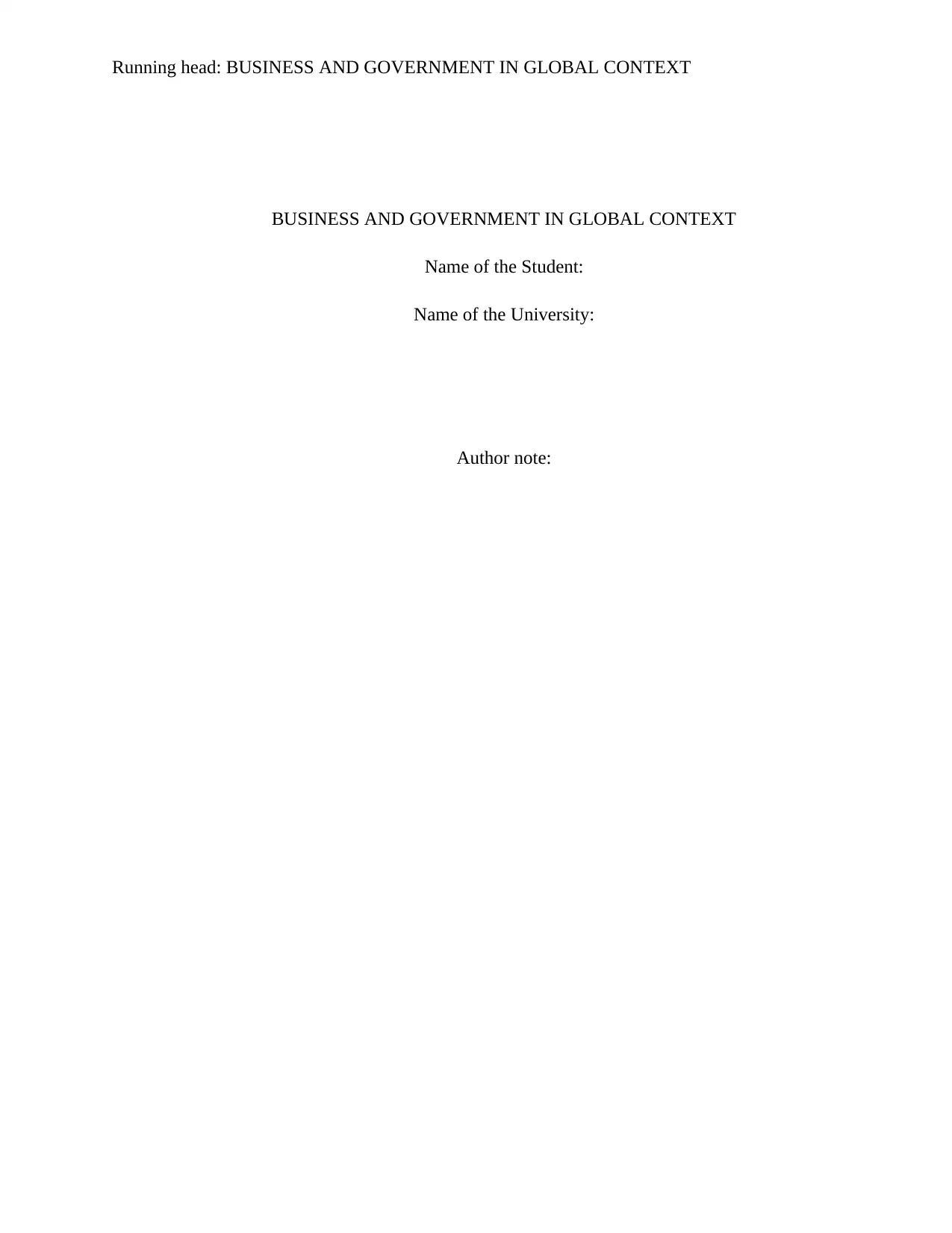
Running head: BUSINESS AND GOVERNMENT IN GLOBAL CONTEXT
BUSINESS AND GOVERNMENT IN GLOBAL CONTEXT
Name of the Student:
Name of the University:
Author note:
BUSINESS AND GOVERNMENT IN GLOBAL CONTEXT
Name of the Student:
Name of the University:
Author note:
Paraphrase This Document
Need a fresh take? Get an instant paraphrase of this document with our AI Paraphraser
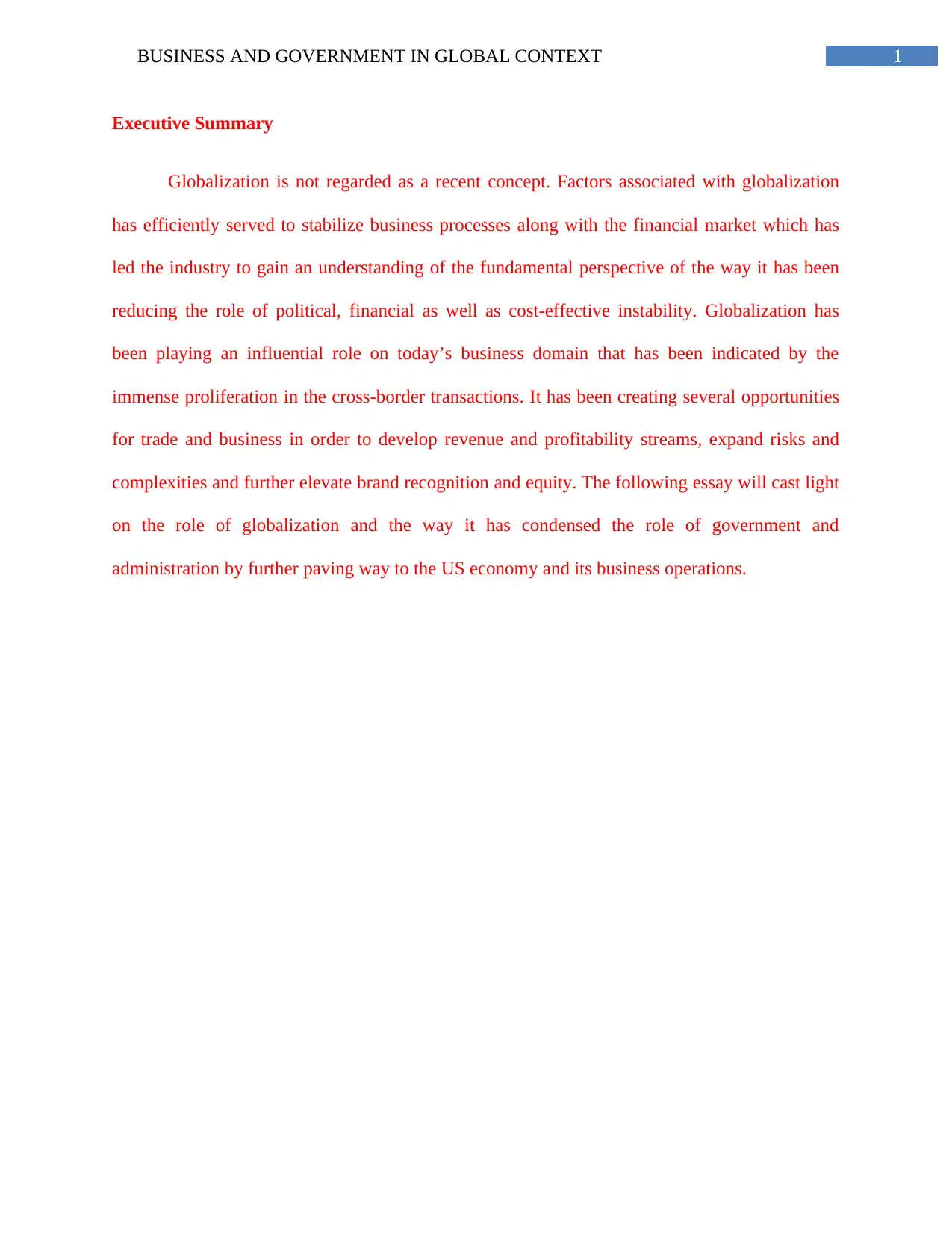
1BUSINESS AND GOVERNMENT IN GLOBAL CONTEXT
Executive Summary
Globalization is not regarded as a recent concept. Factors associated with globalization
has efficiently served to stabilize business processes along with the financial market which has
led the industry to gain an understanding of the fundamental perspective of the way it has been
reducing the role of political, financial as well as cost-effective instability. Globalization has
been playing an influential role on today’s business domain that has been indicated by the
immense proliferation in the cross-border transactions. It has been creating several opportunities
for trade and business in order to develop revenue and profitability streams, expand risks and
complexities and further elevate brand recognition and equity. The following essay will cast light
on the role of globalization and the way it has condensed the role of government and
administration by further paving way to the US economy and its business operations.
Executive Summary
Globalization is not regarded as a recent concept. Factors associated with globalization
has efficiently served to stabilize business processes along with the financial market which has
led the industry to gain an understanding of the fundamental perspective of the way it has been
reducing the role of political, financial as well as cost-effective instability. Globalization has
been playing an influential role on today’s business domain that has been indicated by the
immense proliferation in the cross-border transactions. It has been creating several opportunities
for trade and business in order to develop revenue and profitability streams, expand risks and
complexities and further elevate brand recognition and equity. The following essay will cast light
on the role of globalization and the way it has condensed the role of government and
administration by further paving way to the US economy and its business operations.
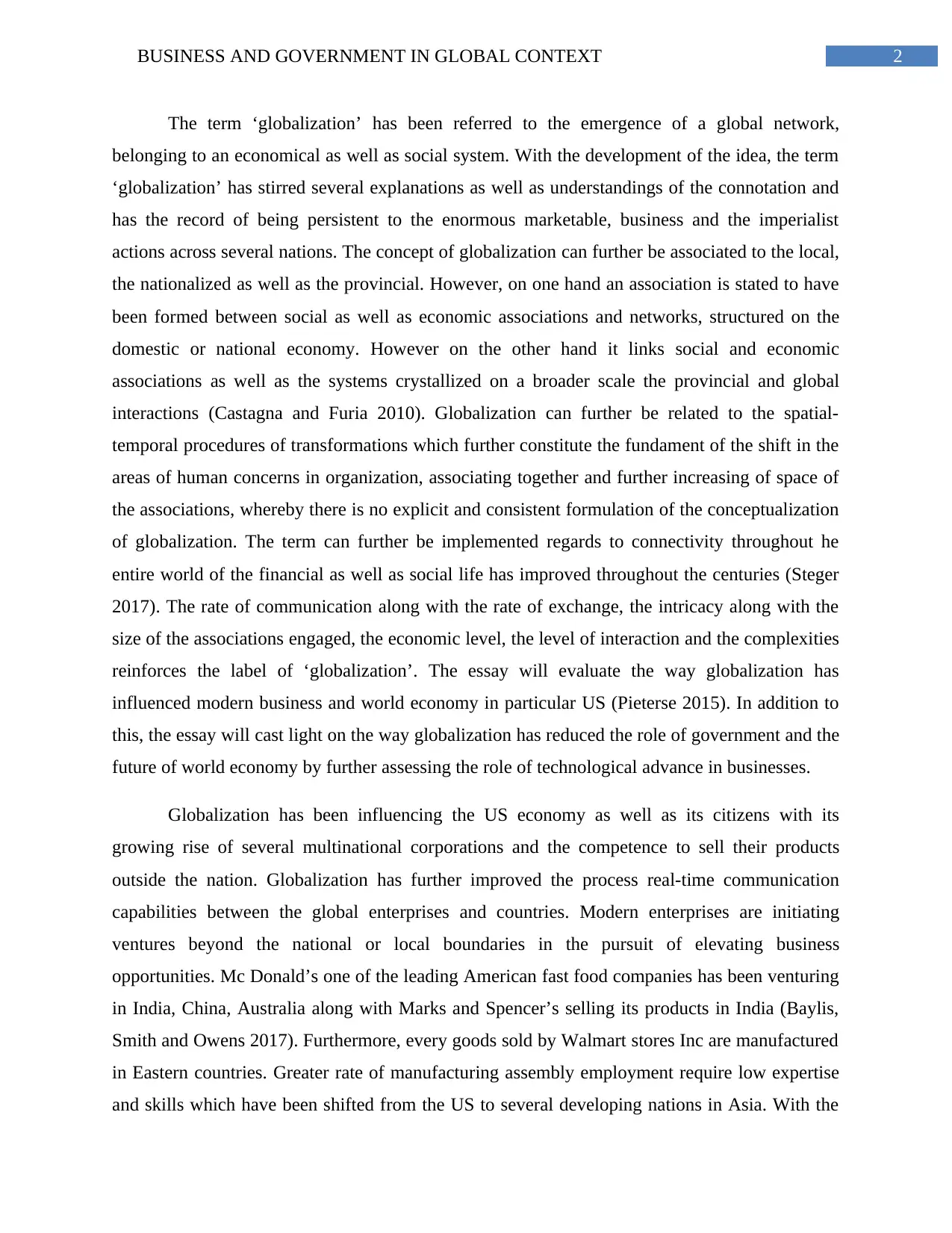
2BUSINESS AND GOVERNMENT IN GLOBAL CONTEXT
The term ‘globalization’ has been referred to the emergence of a global network,
belonging to an economical as well as social system. With the development of the idea, the term
‘globalization’ has stirred several explanations as well as understandings of the connotation and
has the record of being persistent to the enormous marketable, business and the imperialist
actions across several nations. The concept of globalization can further be associated to the local,
the nationalized as well as the provincial. However, on one hand an association is stated to have
been formed between social as well as economic associations and networks, structured on the
domestic or national economy. However on the other hand it links social and economic
associations as well as the systems crystallized on a broader scale the provincial and global
interactions (Castagna and Furia 2010). Globalization can further be related to the spatial-
temporal procedures of transformations which further constitute the fundament of the shift in the
areas of human concerns in organization, associating together and further increasing of space of
the associations, whereby there is no explicit and consistent formulation of the conceptualization
of globalization. The term can further be implemented regards to connectivity throughout he
entire world of the financial as well as social life has improved throughout the centuries (Steger
2017). The rate of communication along with the rate of exchange, the intricacy along with the
size of the associations engaged, the economic level, the level of interaction and the complexities
reinforces the label of ‘globalization’. The essay will evaluate the way globalization has
influenced modern business and world economy in particular US (Pieterse 2015). In addition to
this, the essay will cast light on the way globalization has reduced the role of government and the
future of world economy by further assessing the role of technological advance in businesses.
Globalization has been influencing the US economy as well as its citizens with its
growing rise of several multinational corporations and the competence to sell their products
outside the nation. Globalization has further improved the process real-time communication
capabilities between the global enterprises and countries. Modern enterprises are initiating
ventures beyond the national or local boundaries in the pursuit of elevating business
opportunities. Mc Donald’s one of the leading American fast food companies has been venturing
in India, China, Australia along with Marks and Spencer’s selling its products in India (Baylis,
Smith and Owens 2017). Furthermore, every goods sold by Walmart stores Inc are manufactured
in Eastern countries. Greater rate of manufacturing assembly employment require low expertise
and skills which have been shifted from the US to several developing nations in Asia. With the
The term ‘globalization’ has been referred to the emergence of a global network,
belonging to an economical as well as social system. With the development of the idea, the term
‘globalization’ has stirred several explanations as well as understandings of the connotation and
has the record of being persistent to the enormous marketable, business and the imperialist
actions across several nations. The concept of globalization can further be associated to the local,
the nationalized as well as the provincial. However, on one hand an association is stated to have
been formed between social as well as economic associations and networks, structured on the
domestic or national economy. However on the other hand it links social and economic
associations as well as the systems crystallized on a broader scale the provincial and global
interactions (Castagna and Furia 2010). Globalization can further be related to the spatial-
temporal procedures of transformations which further constitute the fundament of the shift in the
areas of human concerns in organization, associating together and further increasing of space of
the associations, whereby there is no explicit and consistent formulation of the conceptualization
of globalization. The term can further be implemented regards to connectivity throughout he
entire world of the financial as well as social life has improved throughout the centuries (Steger
2017). The rate of communication along with the rate of exchange, the intricacy along with the
size of the associations engaged, the economic level, the level of interaction and the complexities
reinforces the label of ‘globalization’. The essay will evaluate the way globalization has
influenced modern business and world economy in particular US (Pieterse 2015). In addition to
this, the essay will cast light on the way globalization has reduced the role of government and the
future of world economy by further assessing the role of technological advance in businesses.
Globalization has been influencing the US economy as well as its citizens with its
growing rise of several multinational corporations and the competence to sell their products
outside the nation. Globalization has further improved the process real-time communication
capabilities between the global enterprises and countries. Modern enterprises are initiating
ventures beyond the national or local boundaries in the pursuit of elevating business
opportunities. Mc Donald’s one of the leading American fast food companies has been venturing
in India, China, Australia along with Marks and Spencer’s selling its products in India (Baylis,
Smith and Owens 2017). Furthermore, every goods sold by Walmart stores Inc are manufactured
in Eastern countries. Greater rate of manufacturing assembly employment require low expertise
and skills which have been shifted from the US to several developing nations in Asia. With the
⊘ This is a preview!⊘
Do you want full access?
Subscribe today to unlock all pages.

Trusted by 1+ million students worldwide
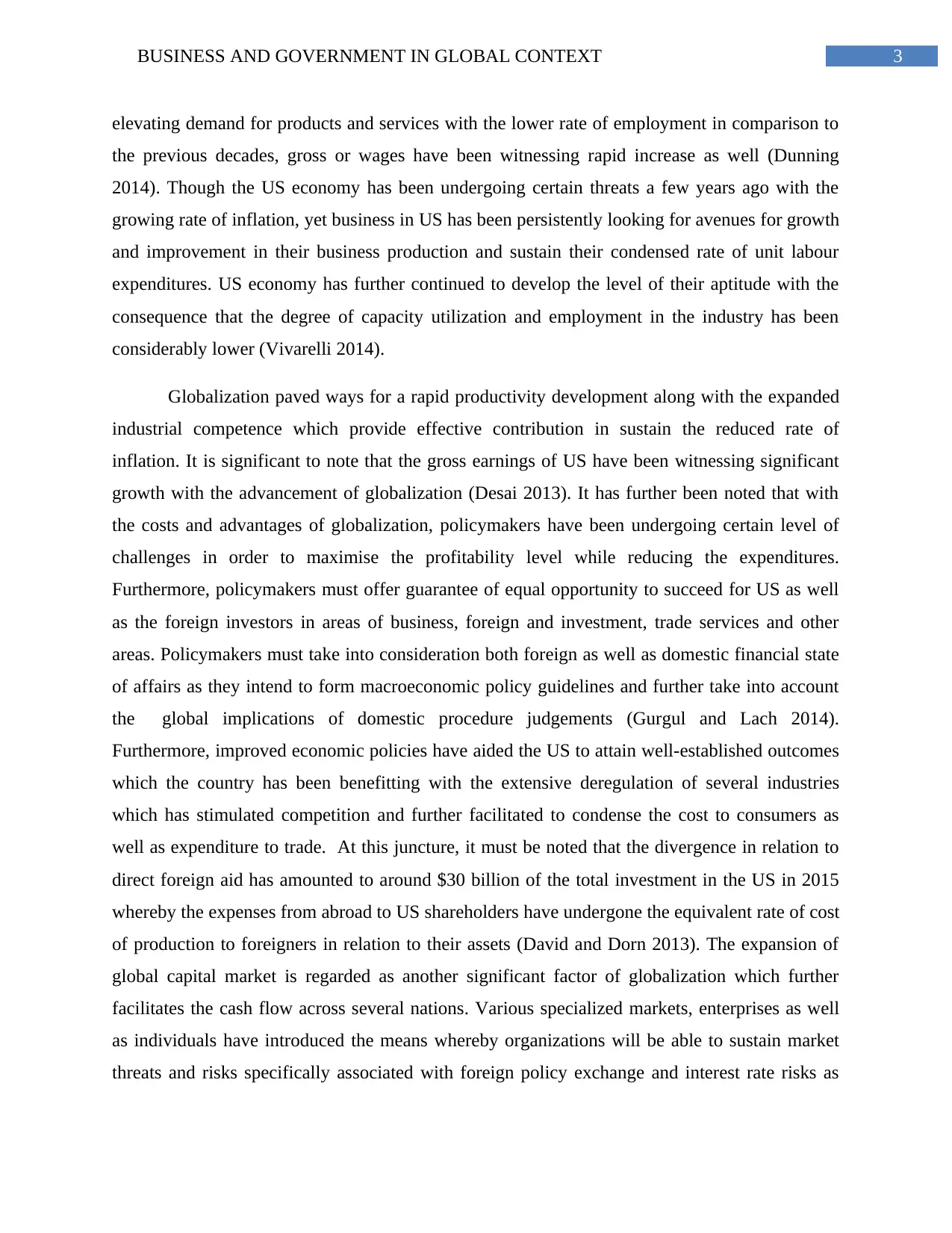
3BUSINESS AND GOVERNMENT IN GLOBAL CONTEXT
elevating demand for products and services with the lower rate of employment in comparison to
the previous decades, gross or wages have been witnessing rapid increase as well (Dunning
2014). Though the US economy has been undergoing certain threats a few years ago with the
growing rate of inflation, yet business in US has been persistently looking for avenues for growth
and improvement in their business production and sustain their condensed rate of unit labour
expenditures. US economy has further continued to develop the level of their aptitude with the
consequence that the degree of capacity utilization and employment in the industry has been
considerably lower (Vivarelli 2014).
Globalization paved ways for a rapid productivity development along with the expanded
industrial competence which provide effective contribution in sustain the reduced rate of
inflation. It is significant to note that the gross earnings of US have been witnessing significant
growth with the advancement of globalization (Desai 2013). It has further been noted that with
the costs and advantages of globalization, policymakers have been undergoing certain level of
challenges in order to maximise the profitability level while reducing the expenditures.
Furthermore, policymakers must offer guarantee of equal opportunity to succeed for US as well
as the foreign investors in areas of business, foreign and investment, trade services and other
areas. Policymakers must take into consideration both foreign as well as domestic financial state
of affairs as they intend to form macroeconomic policy guidelines and further take into account
the global implications of domestic procedure judgements (Gurgul and Lach 2014).
Furthermore, improved economic policies have aided the US to attain well-established outcomes
which the country has been benefitting with the extensive deregulation of several industries
which has stimulated competition and further facilitated to condense the cost to consumers as
well as expenditure to trade. At this juncture, it must be noted that the divergence in relation to
direct foreign aid has amounted to around $30 billion of the total investment in the US in 2015
whereby the expenses from abroad to US shareholders have undergone the equivalent rate of cost
of production to foreigners in relation to their assets (David and Dorn 2013). The expansion of
global capital market is regarded as another significant factor of globalization which further
facilitates the cash flow across several nations. Various specialized markets, enterprises as well
as individuals have introduced the means whereby organizations will be able to sustain market
threats and risks specifically associated with foreign policy exchange and interest rate risks as
elevating demand for products and services with the lower rate of employment in comparison to
the previous decades, gross or wages have been witnessing rapid increase as well (Dunning
2014). Though the US economy has been undergoing certain threats a few years ago with the
growing rate of inflation, yet business in US has been persistently looking for avenues for growth
and improvement in their business production and sustain their condensed rate of unit labour
expenditures. US economy has further continued to develop the level of their aptitude with the
consequence that the degree of capacity utilization and employment in the industry has been
considerably lower (Vivarelli 2014).
Globalization paved ways for a rapid productivity development along with the expanded
industrial competence which provide effective contribution in sustain the reduced rate of
inflation. It is significant to note that the gross earnings of US have been witnessing significant
growth with the advancement of globalization (Desai 2013). It has further been noted that with
the costs and advantages of globalization, policymakers have been undergoing certain level of
challenges in order to maximise the profitability level while reducing the expenditures.
Furthermore, policymakers must offer guarantee of equal opportunity to succeed for US as well
as the foreign investors in areas of business, foreign and investment, trade services and other
areas. Policymakers must take into consideration both foreign as well as domestic financial state
of affairs as they intend to form macroeconomic policy guidelines and further take into account
the global implications of domestic procedure judgements (Gurgul and Lach 2014).
Furthermore, improved economic policies have aided the US to attain well-established outcomes
which the country has been benefitting with the extensive deregulation of several industries
which has stimulated competition and further facilitated to condense the cost to consumers as
well as expenditure to trade. At this juncture, it must be noted that the divergence in relation to
direct foreign aid has amounted to around $30 billion of the total investment in the US in 2015
whereby the expenses from abroad to US shareholders have undergone the equivalent rate of cost
of production to foreigners in relation to their assets (David and Dorn 2013). The expansion of
global capital market is regarded as another significant factor of globalization which further
facilitates the cash flow across several nations. Various specialized markets, enterprises as well
as individuals have introduced the means whereby organizations will be able to sustain market
threats and risks specifically associated with foreign policy exchange and interest rate risks as
Paraphrase This Document
Need a fresh take? Get an instant paraphrase of this document with our AI Paraphraser
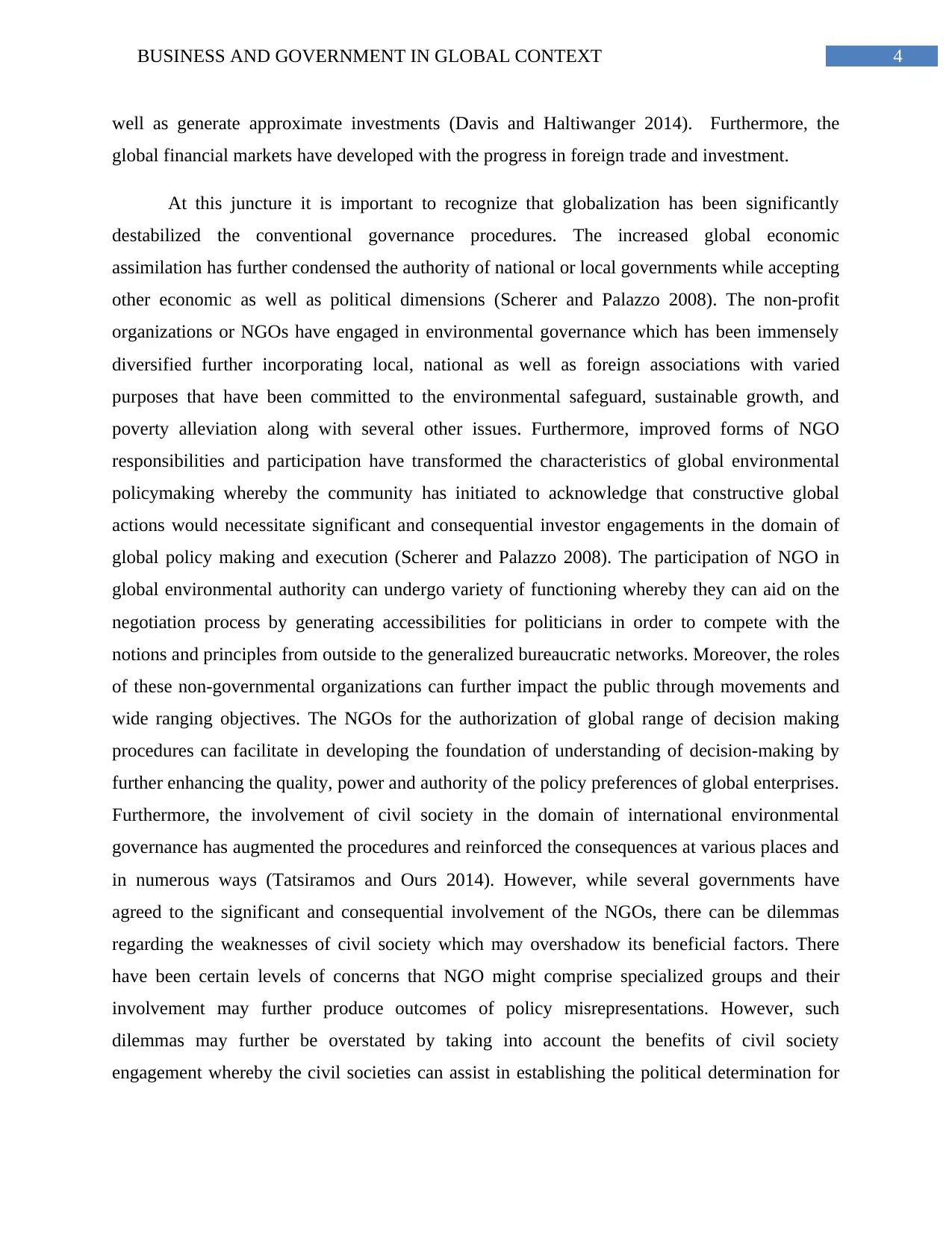
4BUSINESS AND GOVERNMENT IN GLOBAL CONTEXT
well as generate approximate investments (Davis and Haltiwanger 2014). Furthermore, the
global financial markets have developed with the progress in foreign trade and investment.
At this juncture it is important to recognize that globalization has been significantly
destabilized the conventional governance procedures. The increased global economic
assimilation has further condensed the authority of national or local governments while accepting
other economic as well as political dimensions (Scherer and Palazzo 2008). The non-profit
organizations or NGOs have engaged in environmental governance which has been immensely
diversified further incorporating local, national as well as foreign associations with varied
purposes that have been committed to the environmental safeguard, sustainable growth, and
poverty alleviation along with several other issues. Furthermore, improved forms of NGO
responsibilities and participation have transformed the characteristics of global environmental
policymaking whereby the community has initiated to acknowledge that constructive global
actions would necessitate significant and consequential investor engagements in the domain of
global policy making and execution (Scherer and Palazzo 2008). The participation of NGO in
global environmental authority can undergo variety of functioning whereby they can aid on the
negotiation process by generating accessibilities for politicians in order to compete with the
notions and principles from outside to the generalized bureaucratic networks. Moreover, the roles
of these non-governmental organizations can further impact the public through movements and
wide ranging objectives. The NGOs for the authorization of global range of decision making
procedures can facilitate in developing the foundation of understanding of decision-making by
further enhancing the quality, power and authority of the policy preferences of global enterprises.
Furthermore, the involvement of civil society in the domain of international environmental
governance has augmented the procedures and reinforced the consequences at various places and
in numerous ways (Tatsiramos and Ours 2014). However, while several governments have
agreed to the significant and consequential involvement of the NGOs, there can be dilemmas
regarding the weaknesses of civil society which may overshadow its beneficial factors. There
have been certain levels of concerns that NGO might comprise specialized groups and their
involvement may further produce outcomes of policy misrepresentations. However, such
dilemmas may further be overstated by taking into account the benefits of civil society
engagement whereby the civil societies can assist in establishing the political determination for
well as generate approximate investments (Davis and Haltiwanger 2014). Furthermore, the
global financial markets have developed with the progress in foreign trade and investment.
At this juncture it is important to recognize that globalization has been significantly
destabilized the conventional governance procedures. The increased global economic
assimilation has further condensed the authority of national or local governments while accepting
other economic as well as political dimensions (Scherer and Palazzo 2008). The non-profit
organizations or NGOs have engaged in environmental governance which has been immensely
diversified further incorporating local, national as well as foreign associations with varied
purposes that have been committed to the environmental safeguard, sustainable growth, and
poverty alleviation along with several other issues. Furthermore, improved forms of NGO
responsibilities and participation have transformed the characteristics of global environmental
policymaking whereby the community has initiated to acknowledge that constructive global
actions would necessitate significant and consequential investor engagements in the domain of
global policy making and execution (Scherer and Palazzo 2008). The participation of NGO in
global environmental authority can undergo variety of functioning whereby they can aid on the
negotiation process by generating accessibilities for politicians in order to compete with the
notions and principles from outside to the generalized bureaucratic networks. Moreover, the roles
of these non-governmental organizations can further impact the public through movements and
wide ranging objectives. The NGOs for the authorization of global range of decision making
procedures can facilitate in developing the foundation of understanding of decision-making by
further enhancing the quality, power and authority of the policy preferences of global enterprises.
Furthermore, the involvement of civil society in the domain of international environmental
governance has augmented the procedures and reinforced the consequences at various places and
in numerous ways (Tatsiramos and Ours 2014). However, while several governments have
agreed to the significant and consequential involvement of the NGOs, there can be dilemmas
regarding the weaknesses of civil society which may overshadow its beneficial factors. There
have been certain levels of concerns that NGO might comprise specialized groups and their
involvement may further produce outcomes of policy misrepresentations. However, such
dilemmas may further be overstated by taking into account the benefits of civil society
engagement whereby the civil societies can assist in establishing the political determination for
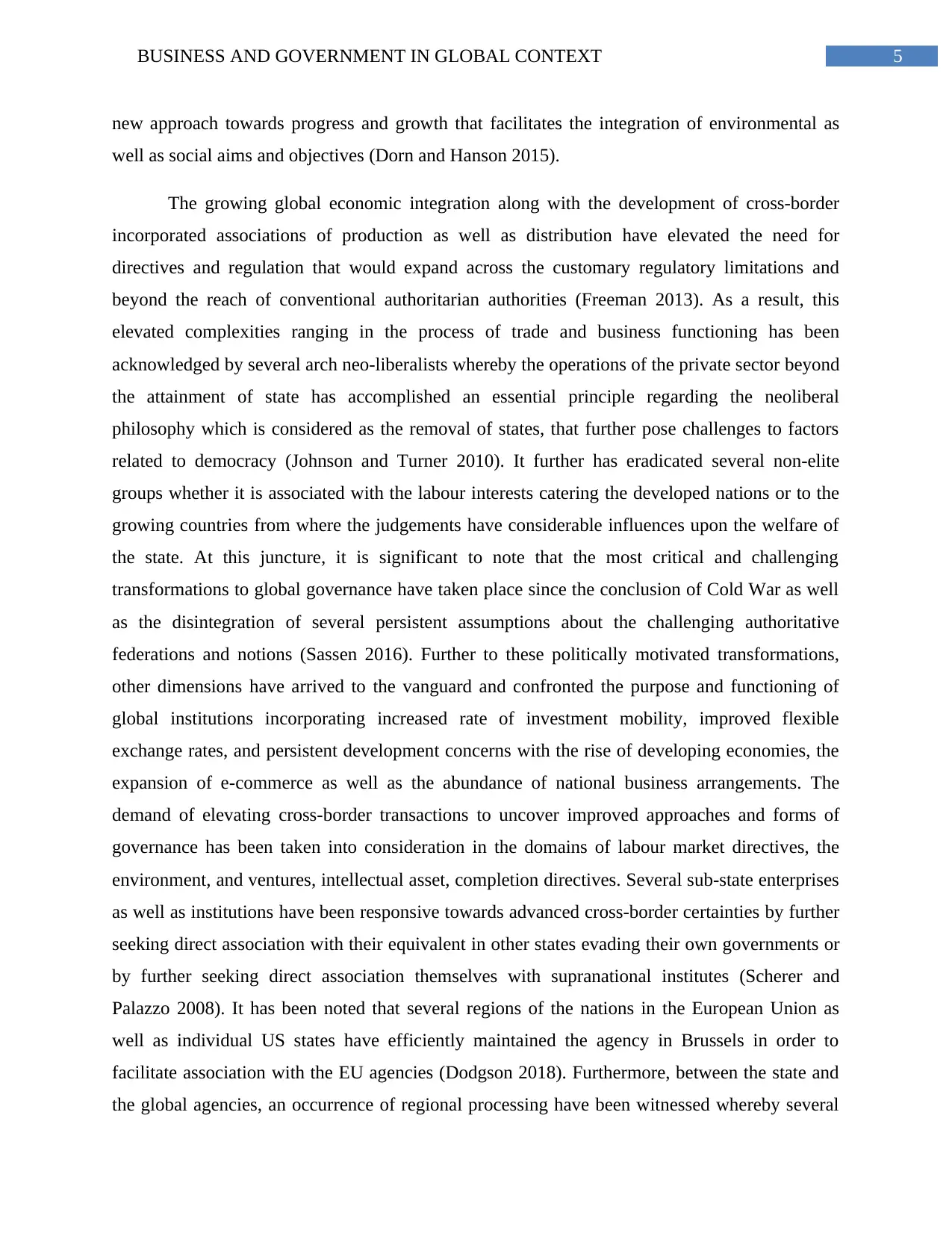
5BUSINESS AND GOVERNMENT IN GLOBAL CONTEXT
new approach towards progress and growth that facilitates the integration of environmental as
well as social aims and objectives (Dorn and Hanson 2015).
The growing global economic integration along with the development of cross-border
incorporated associations of production as well as distribution have elevated the need for
directives and regulation that would expand across the customary regulatory limitations and
beyond the reach of conventional authoritarian authorities (Freeman 2013). As a result, this
elevated complexities ranging in the process of trade and business functioning has been
acknowledged by several arch neo-liberalists whereby the operations of the private sector beyond
the attainment of state has accomplished an essential principle regarding the neoliberal
philosophy which is considered as the removal of states, that further pose challenges to factors
related to democracy (Johnson and Turner 2010). It further has eradicated several non-elite
groups whether it is associated with the labour interests catering the developed nations or to the
growing countries from where the judgements have considerable influences upon the welfare of
the state. At this juncture, it is significant to note that the most critical and challenging
transformations to global governance have taken place since the conclusion of Cold War as well
as the disintegration of several persistent assumptions about the challenging authoritative
federations and notions (Sassen 2016). Further to these politically motivated transformations,
other dimensions have arrived to the vanguard and confronted the purpose and functioning of
global institutions incorporating increased rate of investment mobility, improved flexible
exchange rates, and persistent development concerns with the rise of developing economies, the
expansion of e-commerce as well as the abundance of national business arrangements. The
demand of elevating cross-border transactions to uncover improved approaches and forms of
governance has been taken into consideration in the domains of labour market directives, the
environment, and ventures, intellectual asset, completion directives. Several sub-state enterprises
as well as institutions have been responsive towards advanced cross-border certainties by further
seeking direct association with their equivalent in other states evading their own governments or
by further seeking direct association themselves with supranational institutes (Scherer and
Palazzo 2008). It has been noted that several regions of the nations in the European Union as
well as individual US states have efficiently maintained the agency in Brussels in order to
facilitate association with the EU agencies (Dodgson 2018). Furthermore, between the state and
the global agencies, an occurrence of regional processing have been witnessed whereby several
new approach towards progress and growth that facilitates the integration of environmental as
well as social aims and objectives (Dorn and Hanson 2015).
The growing global economic integration along with the development of cross-border
incorporated associations of production as well as distribution have elevated the need for
directives and regulation that would expand across the customary regulatory limitations and
beyond the reach of conventional authoritarian authorities (Freeman 2013). As a result, this
elevated complexities ranging in the process of trade and business functioning has been
acknowledged by several arch neo-liberalists whereby the operations of the private sector beyond
the attainment of state has accomplished an essential principle regarding the neoliberal
philosophy which is considered as the removal of states, that further pose challenges to factors
related to democracy (Johnson and Turner 2010). It further has eradicated several non-elite
groups whether it is associated with the labour interests catering the developed nations or to the
growing countries from where the judgements have considerable influences upon the welfare of
the state. At this juncture, it is significant to note that the most critical and challenging
transformations to global governance have taken place since the conclusion of Cold War as well
as the disintegration of several persistent assumptions about the challenging authoritative
federations and notions (Sassen 2016). Further to these politically motivated transformations,
other dimensions have arrived to the vanguard and confronted the purpose and functioning of
global institutions incorporating increased rate of investment mobility, improved flexible
exchange rates, and persistent development concerns with the rise of developing economies, the
expansion of e-commerce as well as the abundance of national business arrangements. The
demand of elevating cross-border transactions to uncover improved approaches and forms of
governance has been taken into consideration in the domains of labour market directives, the
environment, and ventures, intellectual asset, completion directives. Several sub-state enterprises
as well as institutions have been responsive towards advanced cross-border certainties by further
seeking direct association with their equivalent in other states evading their own governments or
by further seeking direct association themselves with supranational institutes (Scherer and
Palazzo 2008). It has been noted that several regions of the nations in the European Union as
well as individual US states have efficiently maintained the agency in Brussels in order to
facilitate association with the EU agencies (Dodgson 2018). Furthermore, between the state and
the global agencies, an occurrence of regional processing have been witnessed whereby several
⊘ This is a preview!⊘
Do you want full access?
Subscribe today to unlock all pages.

Trusted by 1+ million students worldwide
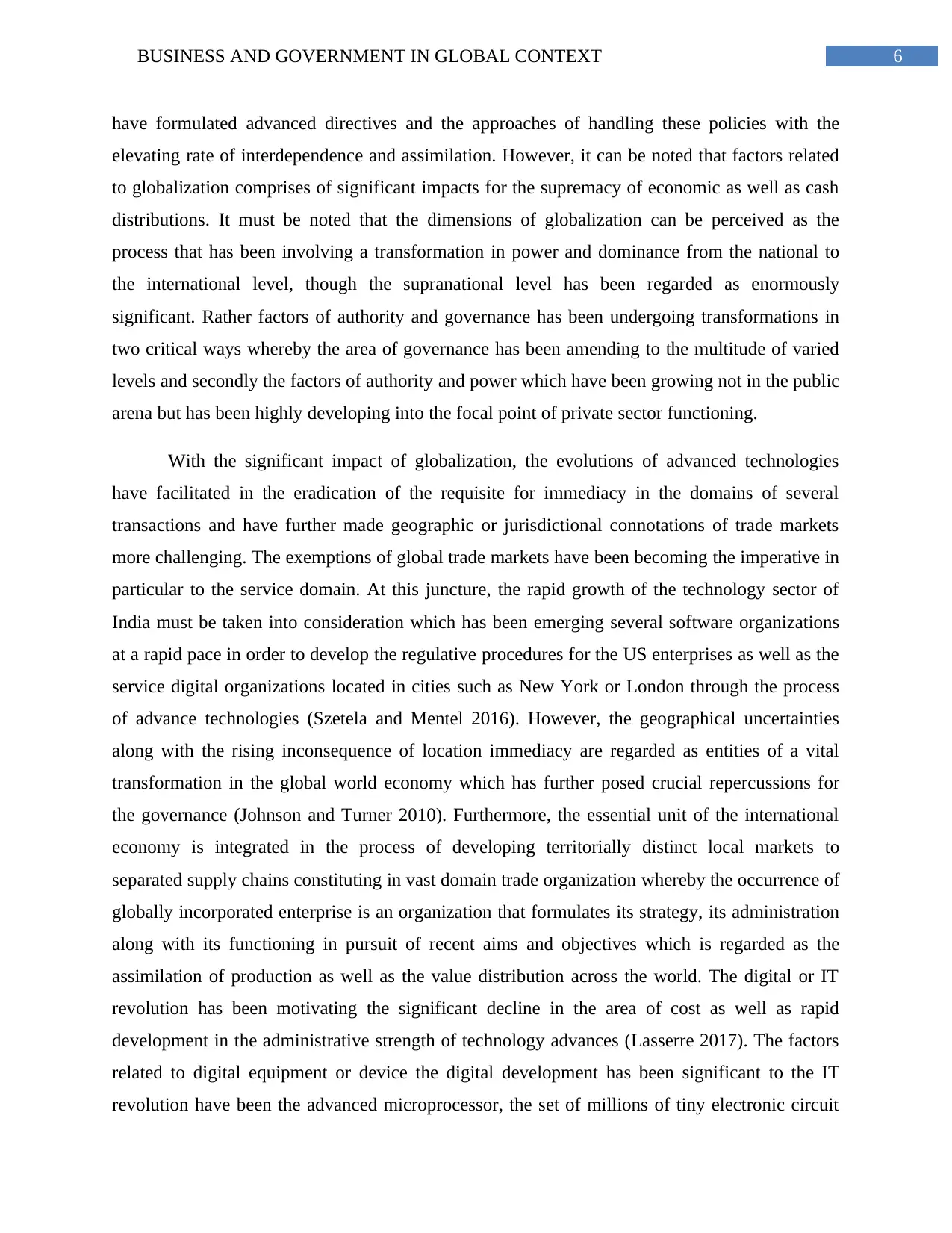
6BUSINESS AND GOVERNMENT IN GLOBAL CONTEXT
have formulated advanced directives and the approaches of handling these policies with the
elevating rate of interdependence and assimilation. However, it can be noted that factors related
to globalization comprises of significant impacts for the supremacy of economic as well as cash
distributions. It must be noted that the dimensions of globalization can be perceived as the
process that has been involving a transformation in power and dominance from the national to
the international level, though the supranational level has been regarded as enormously
significant. Rather factors of authority and governance has been undergoing transformations in
two critical ways whereby the area of governance has been amending to the multitude of varied
levels and secondly the factors of authority and power which have been growing not in the public
arena but has been highly developing into the focal point of private sector functioning.
With the significant impact of globalization, the evolutions of advanced technologies
have facilitated in the eradication of the requisite for immediacy in the domains of several
transactions and have further made geographic or jurisdictional connotations of trade markets
more challenging. The exemptions of global trade markets have been becoming the imperative in
particular to the service domain. At this juncture, the rapid growth of the technology sector of
India must be taken into consideration which has been emerging several software organizations
at a rapid pace in order to develop the regulative procedures for the US enterprises as well as the
service digital organizations located in cities such as New York or London through the process
of advance technologies (Szetela and Mentel 2016). However, the geographical uncertainties
along with the rising inconsequence of location immediacy are regarded as entities of a vital
transformation in the global world economy which has further posed crucial repercussions for
the governance (Johnson and Turner 2010). Furthermore, the essential unit of the international
economy is integrated in the process of developing territorially distinct local markets to
separated supply chains constituting in vast domain trade organization whereby the occurrence of
globally incorporated enterprise is an organization that formulates its strategy, its administration
along with its functioning in pursuit of recent aims and objectives which is regarded as the
assimilation of production as well as the value distribution across the world. The digital or IT
revolution has been motivating the significant decline in the area of cost as well as rapid
development in the administrative strength of technology advances (Lasserre 2017). The factors
related to digital equipment or device the digital development has been significant to the IT
revolution have been the advanced microprocessor, the set of millions of tiny electronic circuit
have formulated advanced directives and the approaches of handling these policies with the
elevating rate of interdependence and assimilation. However, it can be noted that factors related
to globalization comprises of significant impacts for the supremacy of economic as well as cash
distributions. It must be noted that the dimensions of globalization can be perceived as the
process that has been involving a transformation in power and dominance from the national to
the international level, though the supranational level has been regarded as enormously
significant. Rather factors of authority and governance has been undergoing transformations in
two critical ways whereby the area of governance has been amending to the multitude of varied
levels and secondly the factors of authority and power which have been growing not in the public
arena but has been highly developing into the focal point of private sector functioning.
With the significant impact of globalization, the evolutions of advanced technologies
have facilitated in the eradication of the requisite for immediacy in the domains of several
transactions and have further made geographic or jurisdictional connotations of trade markets
more challenging. The exemptions of global trade markets have been becoming the imperative in
particular to the service domain. At this juncture, the rapid growth of the technology sector of
India must be taken into consideration which has been emerging several software organizations
at a rapid pace in order to develop the regulative procedures for the US enterprises as well as the
service digital organizations located in cities such as New York or London through the process
of advance technologies (Szetela and Mentel 2016). However, the geographical uncertainties
along with the rising inconsequence of location immediacy are regarded as entities of a vital
transformation in the global world economy which has further posed crucial repercussions for
the governance (Johnson and Turner 2010). Furthermore, the essential unit of the international
economy is integrated in the process of developing territorially distinct local markets to
separated supply chains constituting in vast domain trade organization whereby the occurrence of
globally incorporated enterprise is an organization that formulates its strategy, its administration
along with its functioning in pursuit of recent aims and objectives which is regarded as the
assimilation of production as well as the value distribution across the world. The digital or IT
revolution has been motivating the significant decline in the area of cost as well as rapid
development in the administrative strength of technology advances (Lasserre 2017). The factors
related to digital equipment or device the digital development has been significant to the IT
revolution have been the advanced microprocessor, the set of millions of tiny electronic circuit
Paraphrase This Document
Need a fresh take? Get an instant paraphrase of this document with our AI Paraphraser
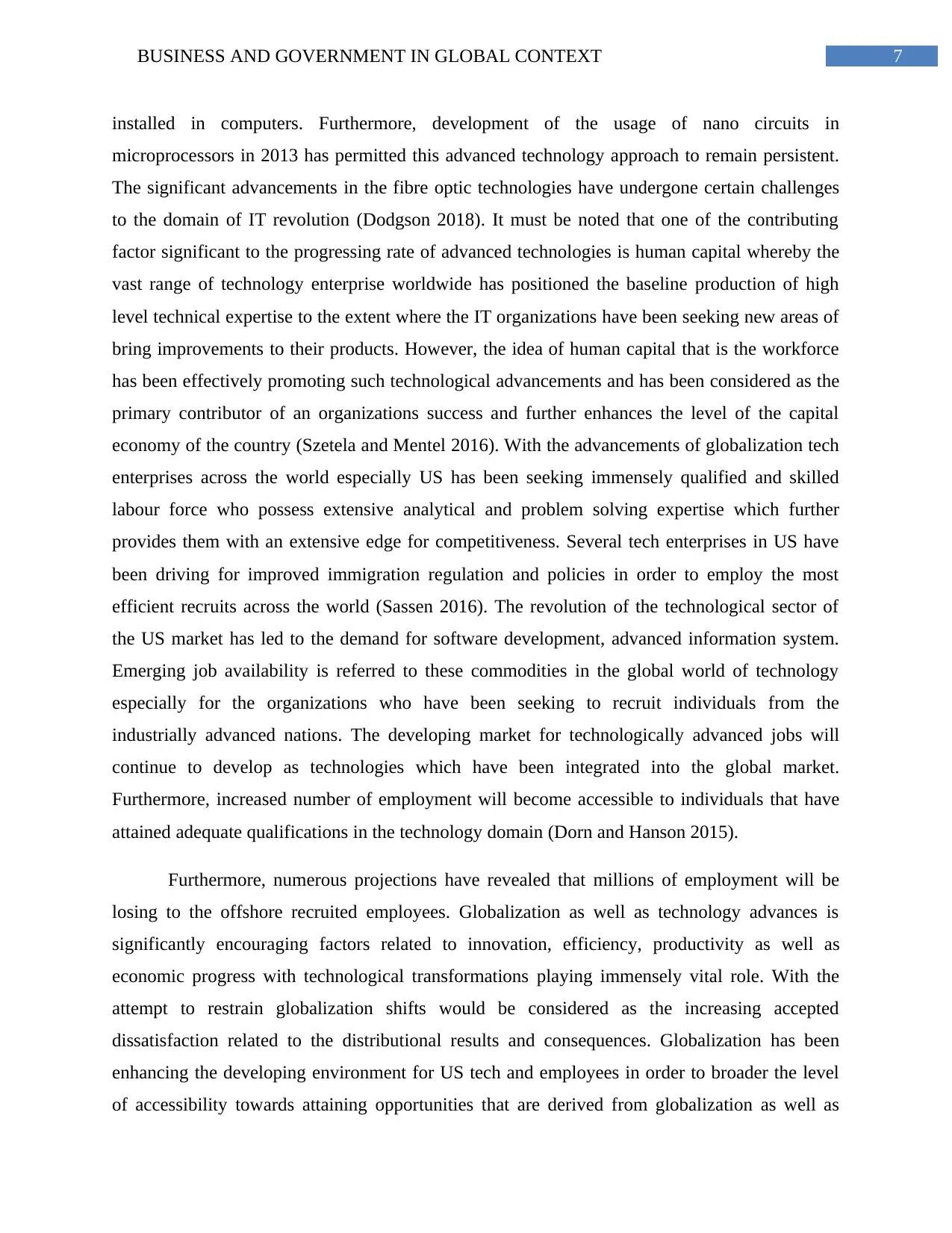
7BUSINESS AND GOVERNMENT IN GLOBAL CONTEXT
installed in computers. Furthermore, development of the usage of nano circuits in
microprocessors in 2013 has permitted this advanced technology approach to remain persistent.
The significant advancements in the fibre optic technologies have undergone certain challenges
to the domain of IT revolution (Dodgson 2018). It must be noted that one of the contributing
factor significant to the progressing rate of advanced technologies is human capital whereby the
vast range of technology enterprise worldwide has positioned the baseline production of high
level technical expertise to the extent where the IT organizations have been seeking new areas of
bring improvements to their products. However, the idea of human capital that is the workforce
has been effectively promoting such technological advancements and has been considered as the
primary contributor of an organizations success and further enhances the level of the capital
economy of the country (Szetela and Mentel 2016). With the advancements of globalization tech
enterprises across the world especially US has been seeking immensely qualified and skilled
labour force who possess extensive analytical and problem solving expertise which further
provides them with an extensive edge for competitiveness. Several tech enterprises in US have
been driving for improved immigration regulation and policies in order to employ the most
efficient recruits across the world (Sassen 2016). The revolution of the technological sector of
the US market has led to the demand for software development, advanced information system.
Emerging job availability is referred to these commodities in the global world of technology
especially for the organizations who have been seeking to recruit individuals from the
industrially advanced nations. The developing market for technologically advanced jobs will
continue to develop as technologies which have been integrated into the global market.
Furthermore, increased number of employment will become accessible to individuals that have
attained adequate qualifications in the technology domain (Dorn and Hanson 2015).
Furthermore, numerous projections have revealed that millions of employment will be
losing to the offshore recruited employees. Globalization as well as technology advances is
significantly encouraging factors related to innovation, efficiency, productivity as well as
economic progress with technological transformations playing immensely vital role. With the
attempt to restrain globalization shifts would be considered as the increasing accepted
dissatisfaction related to the distributional results and consequences. Globalization has been
enhancing the developing environment for US tech and employees in order to broader the level
of accessibility towards attaining opportunities that are derived from globalization as well as
installed in computers. Furthermore, development of the usage of nano circuits in
microprocessors in 2013 has permitted this advanced technology approach to remain persistent.
The significant advancements in the fibre optic technologies have undergone certain challenges
to the domain of IT revolution (Dodgson 2018). It must be noted that one of the contributing
factor significant to the progressing rate of advanced technologies is human capital whereby the
vast range of technology enterprise worldwide has positioned the baseline production of high
level technical expertise to the extent where the IT organizations have been seeking new areas of
bring improvements to their products. However, the idea of human capital that is the workforce
has been effectively promoting such technological advancements and has been considered as the
primary contributor of an organizations success and further enhances the level of the capital
economy of the country (Szetela and Mentel 2016). With the advancements of globalization tech
enterprises across the world especially US has been seeking immensely qualified and skilled
labour force who possess extensive analytical and problem solving expertise which further
provides them with an extensive edge for competitiveness. Several tech enterprises in US have
been driving for improved immigration regulation and policies in order to employ the most
efficient recruits across the world (Sassen 2016). The revolution of the technological sector of
the US market has led to the demand for software development, advanced information system.
Emerging job availability is referred to these commodities in the global world of technology
especially for the organizations who have been seeking to recruit individuals from the
industrially advanced nations. The developing market for technologically advanced jobs will
continue to develop as technologies which have been integrated into the global market.
Furthermore, increased number of employment will become accessible to individuals that have
attained adequate qualifications in the technology domain (Dorn and Hanson 2015).
Furthermore, numerous projections have revealed that millions of employment will be
losing to the offshore recruited employees. Globalization as well as technology advances is
significantly encouraging factors related to innovation, efficiency, productivity as well as
economic progress with technological transformations playing immensely vital role. With the
attempt to restrain globalization shifts would be considered as the increasing accepted
dissatisfaction related to the distributional results and consequences. Globalization has been
enhancing the developing environment for US tech and employees in order to broader the level
of accessibility towards attaining opportunities that are derived from globalization as well as
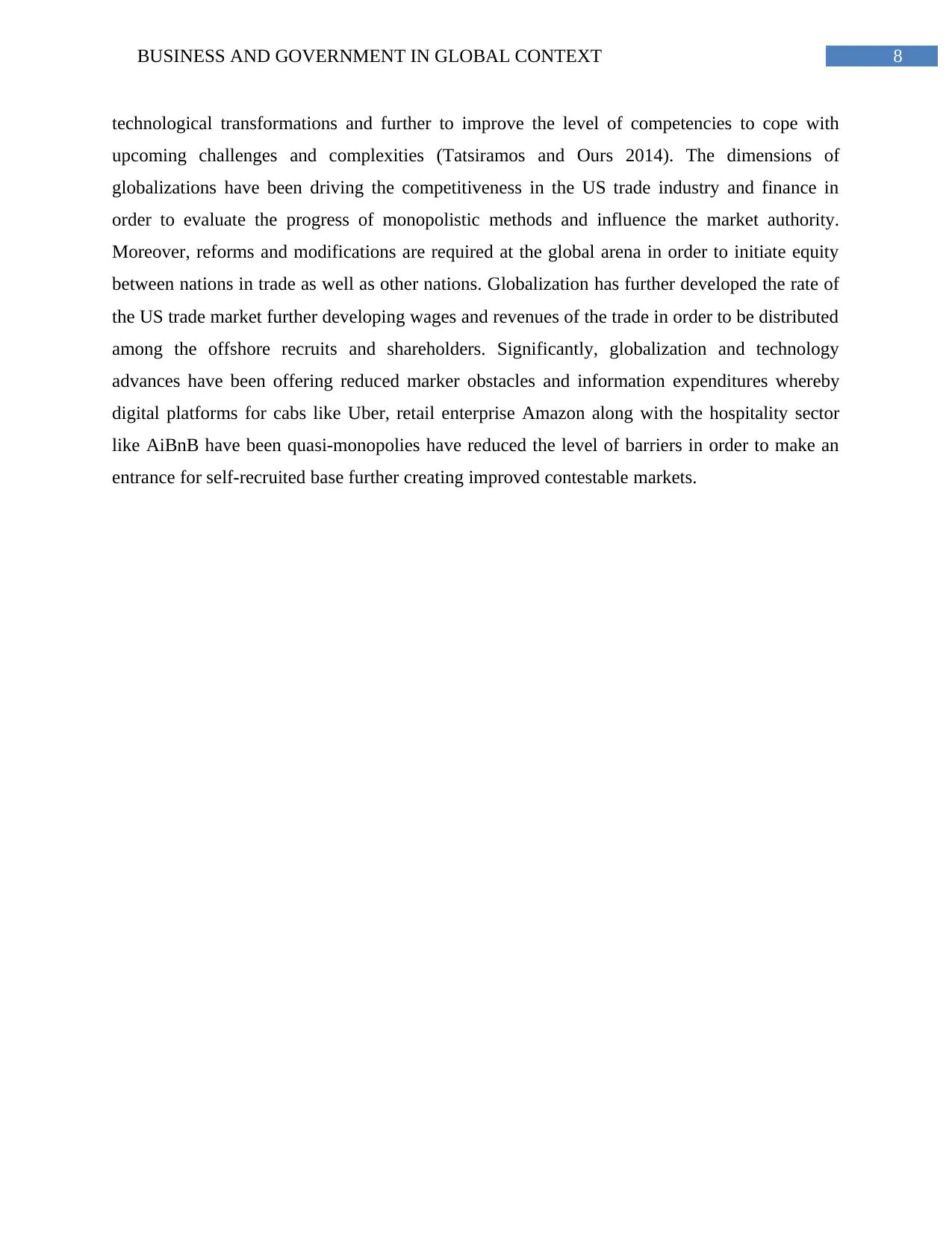
8BUSINESS AND GOVERNMENT IN GLOBAL CONTEXT
technological transformations and further to improve the level of competencies to cope with
upcoming challenges and complexities (Tatsiramos and Ours 2014). The dimensions of
globalizations have been driving the competitiveness in the US trade industry and finance in
order to evaluate the progress of monopolistic methods and influence the market authority.
Moreover, reforms and modifications are required at the global arena in order to initiate equity
between nations in trade as well as other nations. Globalization has further developed the rate of
the US trade market further developing wages and revenues of the trade in order to be distributed
among the offshore recruits and shareholders. Significantly, globalization and technology
advances have been offering reduced marker obstacles and information expenditures whereby
digital platforms for cabs like Uber, retail enterprise Amazon along with the hospitality sector
like AiBnB have been quasi-monopolies have reduced the level of barriers in order to make an
entrance for self-recruited base further creating improved contestable markets.
technological transformations and further to improve the level of competencies to cope with
upcoming challenges and complexities (Tatsiramos and Ours 2014). The dimensions of
globalizations have been driving the competitiveness in the US trade industry and finance in
order to evaluate the progress of monopolistic methods and influence the market authority.
Moreover, reforms and modifications are required at the global arena in order to initiate equity
between nations in trade as well as other nations. Globalization has further developed the rate of
the US trade market further developing wages and revenues of the trade in order to be distributed
among the offshore recruits and shareholders. Significantly, globalization and technology
advances have been offering reduced marker obstacles and information expenditures whereby
digital platforms for cabs like Uber, retail enterprise Amazon along with the hospitality sector
like AiBnB have been quasi-monopolies have reduced the level of barriers in order to make an
entrance for self-recruited base further creating improved contestable markets.
⊘ This is a preview!⊘
Do you want full access?
Subscribe today to unlock all pages.

Trusted by 1+ million students worldwide
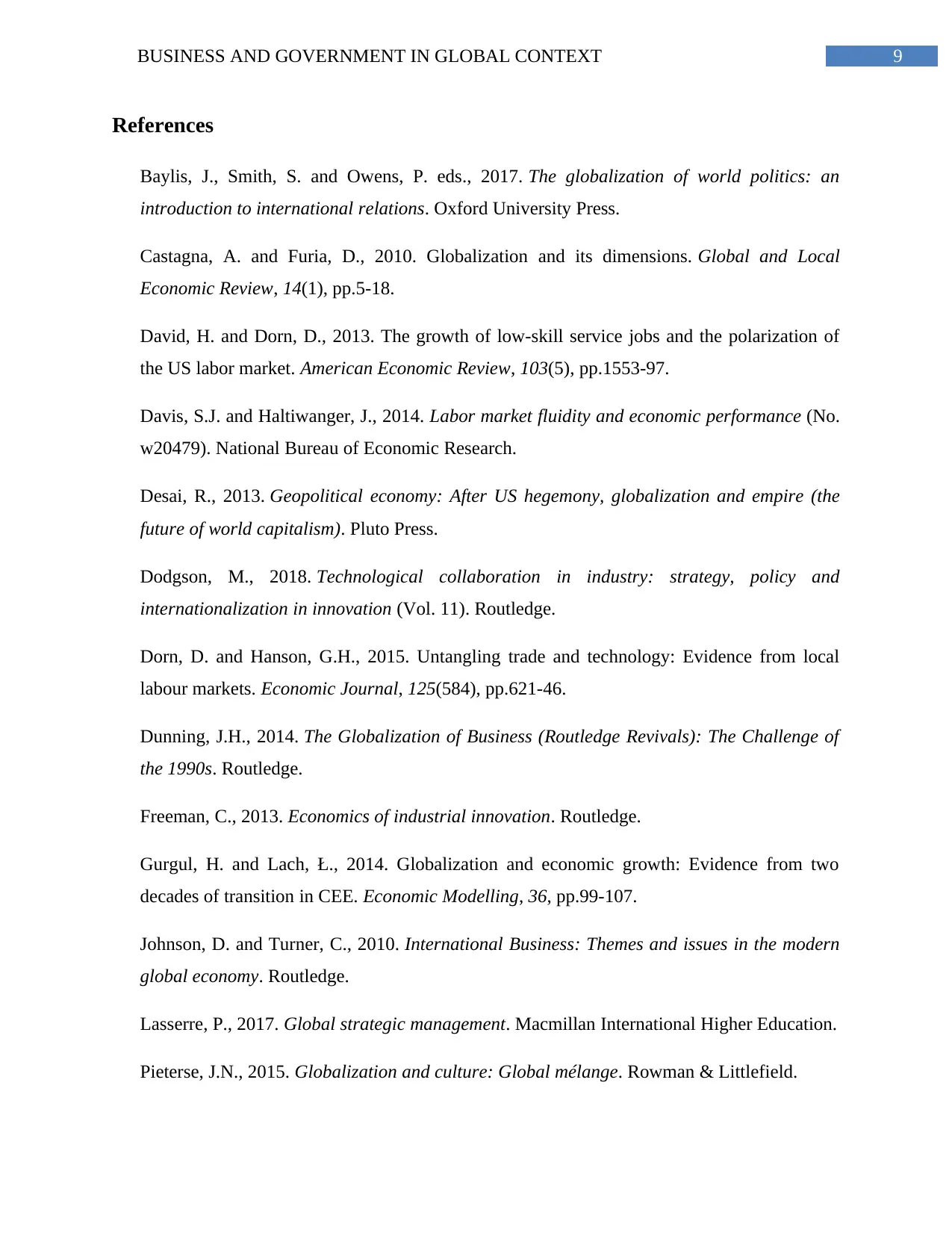
9BUSINESS AND GOVERNMENT IN GLOBAL CONTEXT
References
Baylis, J., Smith, S. and Owens, P. eds., 2017. The globalization of world politics: an
introduction to international relations. Oxford University Press.
Castagna, A. and Furia, D., 2010. Globalization and its dimensions. Global and Local
Economic Review, 14(1), pp.5-18.
David, H. and Dorn, D., 2013. The growth of low-skill service jobs and the polarization of
the US labor market. American Economic Review, 103(5), pp.1553-97.
Davis, S.J. and Haltiwanger, J., 2014. Labor market fluidity and economic performance (No.
w20479). National Bureau of Economic Research.
Desai, R., 2013. Geopolitical economy: After US hegemony, globalization and empire (the
future of world capitalism). Pluto Press.
Dodgson, M., 2018. Technological collaboration in industry: strategy, policy and
internationalization in innovation (Vol. 11). Routledge.
Dorn, D. and Hanson, G.H., 2015. Untangling trade and technology: Evidence from local
labour markets. Economic Journal, 125(584), pp.621-46.
Dunning, J.H., 2014. The Globalization of Business (Routledge Revivals): The Challenge of
the 1990s. Routledge.
Freeman, C., 2013. Economics of industrial innovation. Routledge.
Gurgul, H. and Lach, Ł., 2014. Globalization and economic growth: Evidence from two
decades of transition in CEE. Economic Modelling, 36, pp.99-107.
Johnson, D. and Turner, C., 2010. International Business: Themes and issues in the modern
global economy. Routledge.
Lasserre, P., 2017. Global strategic management. Macmillan International Higher Education.
Pieterse, J.N., 2015. Globalization and culture: Global mélange. Rowman & Littlefield.
References
Baylis, J., Smith, S. and Owens, P. eds., 2017. The globalization of world politics: an
introduction to international relations. Oxford University Press.
Castagna, A. and Furia, D., 2010. Globalization and its dimensions. Global and Local
Economic Review, 14(1), pp.5-18.
David, H. and Dorn, D., 2013. The growth of low-skill service jobs and the polarization of
the US labor market. American Economic Review, 103(5), pp.1553-97.
Davis, S.J. and Haltiwanger, J., 2014. Labor market fluidity and economic performance (No.
w20479). National Bureau of Economic Research.
Desai, R., 2013. Geopolitical economy: After US hegemony, globalization and empire (the
future of world capitalism). Pluto Press.
Dodgson, M., 2018. Technological collaboration in industry: strategy, policy and
internationalization in innovation (Vol. 11). Routledge.
Dorn, D. and Hanson, G.H., 2015. Untangling trade and technology: Evidence from local
labour markets. Economic Journal, 125(584), pp.621-46.
Dunning, J.H., 2014. The Globalization of Business (Routledge Revivals): The Challenge of
the 1990s. Routledge.
Freeman, C., 2013. Economics of industrial innovation. Routledge.
Gurgul, H. and Lach, Ł., 2014. Globalization and economic growth: Evidence from two
decades of transition in CEE. Economic Modelling, 36, pp.99-107.
Johnson, D. and Turner, C., 2010. International Business: Themes and issues in the modern
global economy. Routledge.
Lasserre, P., 2017. Global strategic management. Macmillan International Higher Education.
Pieterse, J.N., 2015. Globalization and culture: Global mélange. Rowman & Littlefield.
Paraphrase This Document
Need a fresh take? Get an instant paraphrase of this document with our AI Paraphraser
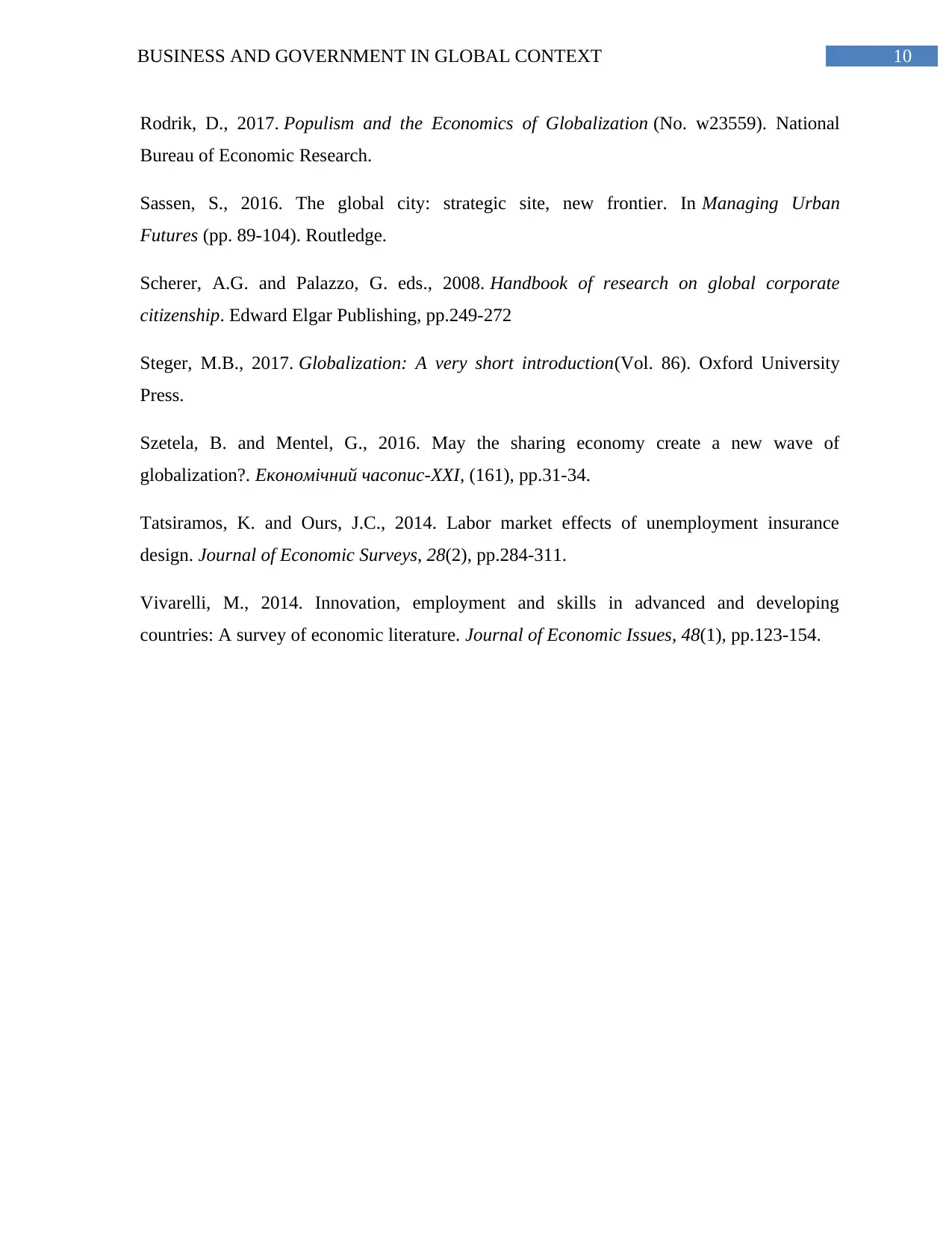
10BUSINESS AND GOVERNMENT IN GLOBAL CONTEXT
Rodrik, D., 2017. Populism and the Economics of Globalization (No. w23559). National
Bureau of Economic Research.
Sassen, S., 2016. The global city: strategic site, new frontier. In Managing Urban
Futures (pp. 89-104). Routledge.
Scherer, A.G. and Palazzo, G. eds., 2008. Handbook of research on global corporate
citizenship. Edward Elgar Publishing, pp.249-272
Steger, M.B., 2017. Globalization: A very short introduction(Vol. 86). Oxford University
Press.
Szetela, B. and Mentel, G., 2016. May the sharing economy create a new wave of
globalization?. Економічний часопис-ХХІ, (161), pp.31-34.
Tatsiramos, K. and Ours, J.C., 2014. Labor market effects of unemployment insurance
design. Journal of Economic Surveys, 28(2), pp.284-311.
Vivarelli, M., 2014. Innovation, employment and skills in advanced and developing
countries: A survey of economic literature. Journal of Economic Issues, 48(1), pp.123-154.
Rodrik, D., 2017. Populism and the Economics of Globalization (No. w23559). National
Bureau of Economic Research.
Sassen, S., 2016. The global city: strategic site, new frontier. In Managing Urban
Futures (pp. 89-104). Routledge.
Scherer, A.G. and Palazzo, G. eds., 2008. Handbook of research on global corporate
citizenship. Edward Elgar Publishing, pp.249-272
Steger, M.B., 2017. Globalization: A very short introduction(Vol. 86). Oxford University
Press.
Szetela, B. and Mentel, G., 2016. May the sharing economy create a new wave of
globalization?. Економічний часопис-ХХІ, (161), pp.31-34.
Tatsiramos, K. and Ours, J.C., 2014. Labor market effects of unemployment insurance
design. Journal of Economic Surveys, 28(2), pp.284-311.
Vivarelli, M., 2014. Innovation, employment and skills in advanced and developing
countries: A survey of economic literature. Journal of Economic Issues, 48(1), pp.123-154.
1 out of 11
Related Documents
Your All-in-One AI-Powered Toolkit for Academic Success.
+13062052269
info@desklib.com
Available 24*7 on WhatsApp / Email
![[object Object]](/_next/static/media/star-bottom.7253800d.svg)
Unlock your academic potential
Copyright © 2020–2026 A2Z Services. All Rights Reserved. Developed and managed by ZUCOL.





